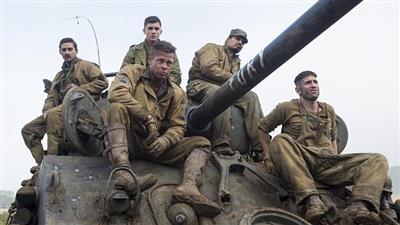
Fury, the new film from writer/director David Ayer, falls in lockstep with his previous work. Ayer, perhaps best known for penning Training Day, has an IMDB entry that reads like Maxim’s top ten ‘dude flicks’ of the 2000s: all guys, guns and grit. Nothing could epitomize Ayer’s interests more than a war movie.
Pushing into Germany towards the end of WWII, Sergeant Don Collier (Pitt) and his four-man crew helm a Sherman tank dubbed “FURY”. Having just lost their front gunner and brother-in-arms, Collier and Co. are saddled with the battle-green desk jockey Norman Ellison (Lerman). From there, the film splits perspectives between Collier and Ellison, the former a war-hardened veteran trying to ready the latter, a scared, idealistic pacifist, for the harsh realities of their kill-or-be-killed lot. Never one to shy away from the darker sides of humanity, Ayer captures their almost father-son relationship through a couple of harrowing scenes. In the first, Collier goes all Staff Sergeant Barnes in Platoon on the inexperienced new fighter, forcing him to make his first kill—an unarmed member of the SS—as Ellison’s fellow soldiers circle around them, laughing. After this “war makes monsters of us all” sequence, Collier’s menacing shadow looms over the next harrowing set piece, one in which Collier and his reluctant protégé abscond from the post-victory revelry of their compatriots to the relative quiet of a frightened German woman’s apartment where Collier quietly orders her to make them some eggs while Ellison and her niece relieve themselves of the unbearable tensions of war.
It’s during these two moments, on the periphery of combat, where Ayer’s take on the effects of war is most poignant, holding Private Ellison and Sergeant Collier up as a before-and-after of each other. The film is less successful where other characters are concerned. The three other tanksmen, the obligatory brothers-in-arms, can be succinctly summed up as: the Christian, the Mexican, and the redneck. As the first two, Shia LeBeouf and Michael Peña actually enhance what were likely stale characters on the page, but The Walking Dead’s Jon Bernthal (he played Shane) continues his trend of playing despicable d-bags. If he were merely an evil guy using war as permission to act out his evil urges, that would be one thing, but by the end the film asks you to sympathize with him and the rest of these somewhat broken men in a Hollywood finale that seems counter to the film’s previous tone.
Ayer is a deft director, at his peak during the intense, almost procedural tank battles, full of ricocheting tracer shells and chess-like strategizing, but he stumbles as a writer. He wants both unflinching realism and superhuman heroics, grey-zone human-against-human atrocity and black-and-white good vs. evil. And while he’s trying to have his cake and eat it too, what we’re unfortunately left with is a really well-made, half-mangled cake.













